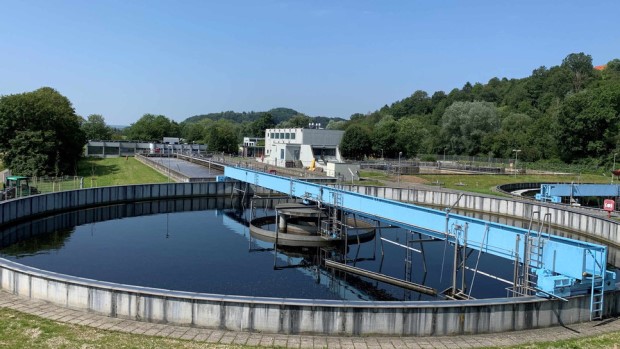On July 21, 2021, Helmfried Meinel, Ministerial Director at the Baden-Württemberg Ministry of the Environment, visited the wastewater treatment plant in Tübingen, where he inaugurated the construction of the so-called fourth treatment stage. The fourth treatment stage will allow residues of pharmaceuticals and household chemicals to be filtered out of wastewater. “The elimination of trace substances is precautionary water protection,” Meinel emphasized. In Tübingen in particular, this plays a major role, he said, because it means that fewer trace substances end up in the Neckar River.
The Ministerial Director explained that Tübingen is only the second wastewater treatment plant in Baden-Württemberg, after the treatment plant in Eriskirch, to use an ozonation plant with downstream filtration for the elimination of trace substances. “Tübingen is thus one of the pioneers for this process combination in Baden-Württemberg. The big advantage is that it has a broad effect.” He said it is effective for a wide range of pharmaceuticals, hormones and numerous other substances. Even germs can be removed from wastewater.
20 wastewater treatment plants have been equipped with the fourth treatment stage so far
With a view to prevention, Meinel explained further, the Ministry of the Environment began several years ago to support the expansion of wastewater treatment plants with innovative processes for the so-called fourth purification stage for the elimination of trace substances. In doing so, the state is concentrating on particularly sensitive bodies of water, as well as large wastewater treatment plants and pollution hotspots.
“On this basis, 20 wastewater treatment plants in Baden-Württemberg are now equipped with a targeted purification stage for the removal of trace substances, and another 23 with this special technology are under construction or in planning.”
- Helmfried Meinel, Ministerial Director
State contributes almost three million euros in Tübingen
The state is contributing almost three million euros to the total eligible costs in Tübingen of almost 13.8 million euros. “This is money well invested,” Meinel said. In addition to the city of Tübingen, the municipalities of Ammerbuch and Rottenburg are also financing the expansion.
The ministerial director also praised the fact that with the completion of the expansion and the commissioning of filtration in Tübingen, phosphorus elimination has now been raised to an even better level. “Aquatic animals and plants also benefit from this, because the ecological condition in the Neckar can be noticeably and sustainably improved.”

















